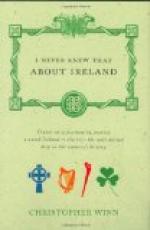The English tourist swallows it all whole as it comes
to him, and writes his account to the sympathetic
Press, which publishes as gospel stories which have
not one word of truth in them. In fact, the term
“English tourist” has come to mean the
same as
gobemouche in France; and clever Pat
knows well enough that there is not a fly in the whole
region of fable which is too large for the brutal
Saxon to swallow. Abject poverty without shoes
to its feet, with only a few rags to cover its unwashed
nakedness, and an unfurnished mud cabin shared with
the pigs and poultry for its sole dwelling-place—abject
poverty begs a copper from “his honour”
for the love of God and the glory of the Blessed Virgin,
telling meantime a heartrending story of privation
and oppression. Abject poverty points to all
the outward signs and circumstances of its woe; but
it forgets the good stone house in which live the
son and the son’s wife—the dozen
or more of cattle grazing free on the mountain side—that
bit of fertile land where the very weeds grow into
beauty by their luxuriance—and those quiet
hundreds hidden away for the sole pleasure of hoarding.
And the English tourist takes it all in, and blazes
out into wrath against the tyrannous landlord who
has reduced an honest citizen to this fearful state
of misery; knowing nothing of the craft which is known
to all the residents round about, and not willing to
believe it were he even told. For the dramatic
instinct is strong in human nature, and in these later
days there is an ebullient surplusage of sympathy
which only desires to find an object. Across the
Bristol Channel, the English tourist finds these objects
ready-made to his hand; and the question is still
further embroiled, and the light of truth still more
obscured, that a few impulsive, credulous, and non-judicially-minded
young people may find something whereon to excite
their emotions, and give vent to them in letters to
the newspapers when excited.
Only the other day a young Irishman who has to do
with the land question was mistaken for a brutal but
credulous Saxon by the jarvey who had him in tow.
Consequently, Pat plied his fancied victim with the
wildest stories of this man’s wrongs and that
lone widow’s sufferings. When he found
out his mistake he laughed and said: “Begorra,
I thought your honour was an English tourist!”
And at a certain trial which took place in Cork, the
judge put by some absurd statement by saying, half-indignant,
half amused: “Do you take me for an English
tourist?” Nevertheless the race will continue
so long as there are excitable young persons of either
sex whose capacity for swallowing flies is practically
unlimited, and an hysterical Press to which they can
betake themselves.
The following authoritative instance of this misplaced
sympathy may suffice. The Westminster Review
published a certain article on the Olphert estate,
among other things. Those who have read it know
its sensational character. At Cork the other
day the priest concerned had to confess on oath that
only three of the Olphert tenants had received relief.[D]




